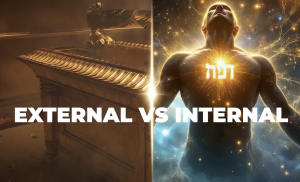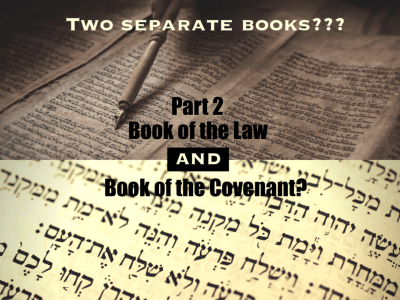Decoding Hebrews – Chapter 8
A Closer Look at the Covenant
We are about to uncover one of the most misunderstood scriptures in the entire New Testament—Hebrews 8:13. This verse reads:
“In that He says, ‘A new covenant,’ He has made the first obsolete. Now what is becoming obsolete and growing old is ready to vanish away.”
For centuries, many pastors and teachers have interpreted this to mean that the Old Covenant—and with it, God’s law—has been abolished. But what if that understanding is completely wrong? What if the text is actually saying something very different—something that changes how we understand the relationship between the Old and New Covenants?
Let’s explore what the author of Hebrews really meant.
The Hebraic Context of Hebrews
 To understand the New Testament properly, we must read it through the eyes of its original audience—first-century Jews who understood the Torah, the priesthood, and the temple. For nearly 1,800 years, Western Christianity has read scripture through a Greco-Roman lens, often missing the original Hebraic intent behind the words.
To understand the New Testament properly, we must read it through the eyes of its original audience—first-century Jews who understood the Torah, the priesthood, and the temple. For nearly 1,800 years, Western Christianity has read scripture through a Greco-Roman lens, often missing the original Hebraic intent behind the words.
Hebrews 8 continues directly from chapter 7, where the author discusses the superiority of the Melchizedek priesthood over the Levitical priesthood. Chapters and verses were added later, so chapter 8 is not a new thought—it’s a continuation of the same argument.
A Better Covenant—Not a Different Law
Hebrews 8:6 says that Yeshua (Jesus) is the “mediator of a better covenant, which was established on better promises.”
Many interpret “better covenant” to mean that the old one was defective and therefore abolished. But that’s not what the text says.
The problem was never with the law—it was with the people who broke it. Verse 8 makes that clear:
“Finding fault with them…”
The fault lies not in God’s commandments but in Israel’s inability to keep them. The law itself remains “holy, just, and good” (Romans 7:12). Therefore, God promised a new covenant—a new relationship framework—that would empower His people to walk in obedience through the Spirit.
The New Covenant in Jeremiah 31
 Hebrews 8 quotes directly from Jeremiah 31:31–34, the only passage in the Hebrew Bible that explicitly describes the New Covenant. Notice what God says:
Hebrews 8 quotes directly from Jeremiah 31:31–34, the only passage in the Hebrew Bible that explicitly describes the New Covenant. Notice what God says:
“I will put My law in their minds, and write it on their hearts…”
If the law had been abolished, there would be nothing to write on the heart. The difference between the old and new covenants is not what law exists, but where it resides. The Old Covenant was external—written on stone tablets. The New Covenant is internal—engraved on the heart by the Holy Spirit.
Covenant ≠ Law
One of the biggest interpretive mistakes Christians make is equating “covenant” with “law.”
In reality, a covenant is the relationship structure, while the law is the terms of that relationship.
Think of a marriage:
- The covenant is the relationship itself.
- The laws are the vows—faithfulness, love, respect, etc.
If one spouse breaks the covenant, it doesn’t mean the vows themselves were wrong. The vows remain good and right; the relationship structure is what’s broken.
So when God created a new covenant, He didn’t abolish His laws. He changed the administration—the priesthood, the mediator, and the location of His law.
What Actually Changed
Here’s what the New Covenant changes:
- The Mediator
- Old: Levi (the Levitical priesthood)
- New: Messiah (Yeshua in the order of Melchizedek)
- The Location of the Law
- Old: Written on stone tablets
- New: Written on human hearts
- The Access Point to God
- Old: Through the earthly temple
- New: Through the heavenly sanctuary, via Christ
- The Power Source
- Old: Human effort and the flesh
- New: The Holy Spirit working within us
The terms of the covenant—the moral law of God—remain the same. But the administration and capacity to fulfill it have changed dramatically.
Modern Analogies
To clarify the distinction, consider these examples:
- Marriage License vs. Marriage Vows:
The relationship may change, but faithfulness and love remain the standard. - Government vs. Constitution:
A new administration takes office, but the Constitution remains the governing law. - Old Phone vs. New Phone:
When you upgrade your device, you don’t discard your data—you transfer it to a better system. Likewise, God transferred His law from tablets of stone to tablets of the heart.
The True Meaning of Hebrews 8:13
Now we can accurately interpret the verse:
“In that He says, ‘A new covenant,’ He has made the first obsolete. Now what is becoming obsolete and growing old is ready to vanish away.”
What is “becoming obsolete” is not God’s law—it is the Levitical administration of that law. The priesthood, temple system, and sacrificial framework were fading away, soon to be fully replaced by Yeshua’s eternal priesthood.
This makes perfect sense in context: Hebrews was written just before the destruction of the Temple in 70 A.D., when the Levitical system literally vanished away.
The Law Remains Holy
Paul affirms this repeatedly:
- “Do we then make void the law through faith? God forbid!” (Romans 3:31)
- “I delight in the law of God.” (Romans 7:22)
- “The carnal mind is not subject to the law of God.” (Romans 8:7)
Even Yeshua declared:
“Do not think that I came to abolish the Law or the Prophets. I did not come to abolish but to fulfill.” (Matthew 5:17)
The law remains—it’s simply under new management. The covenant changed, not the commandments.
Conclusion: A New Administration, Not a New Morality
The author of Hebrews wasn’t announcing the death of the Torah. He was revealing a transition of priesthood and covenant administration—from Levi to Melchizedek, from earthly temple to heavenly sanctuary, from stone tablets to living hearts.
The “old” covenant was growing obsolete because the old priesthood and temple service were about to vanish. The eternal principles of God’s law, however, remain as the moral foundation of His kingdom.
The New Covenant doesn’t erase the law—it empowers us to live it out through the Spirit.
Jim Staley
Passion for Truth Ministries
Full teaching: https://youtu.be/wA4TWR_MGGk












